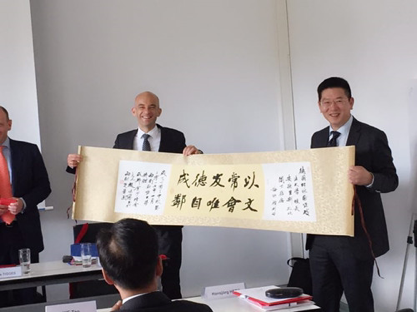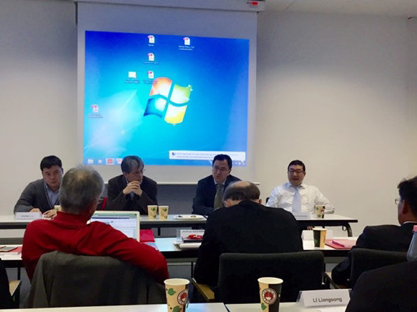From Oct.12th to 13th, the 18th Conference on Monetary Policy, hosted by SWUFE, Berlin School of Economics and Law, and Regional Office in Berlin, Deutsche Bundesbank, and organized by Collaborative Innovation Center of Financial Security, ICFS and Institute for International Political Economy Berlin (IPE Berlin), was held at Room 101 of B Building in Berlin School of Economics and Law. YIN Qingshuang, Vice President of SWUFE, Andreas Zaby, President of Berlin School of Economics and Law, Claus Tigges, President of Regional Office in Berlin, Deutsche Bundesbank, Albrecht Sommer, Vice President of Regional Office in Berlin, Deutsche Bundesbank, FENG Runxiang, Director of Ministry of Foreign Affairs of PBC Shanghai Head Office, WANG Qing, the professor of ICFS, Hansjorg Herr, the professor of Berlin School of Economics and Law, XIE Tao, Previous Dean of College of International Education, and Joshua Aizenman, the professor of University of Southern California, attended the seminar, as well as more than 20 experts and scholars from Universidad de Cantabria, Austrian Institute of Economic Research, School of Oriental and African Studies, Hertie School of Governance, Berlin School of Economics and Law and ICFS. Prof. Jennifer Pedussel of Berlin School of Economics and Law worked as the host.
Andreas Zaby, President of Berlin School of Economics and Law, extended a warm welcome to guests from China and foreign countries. He pointed out that the long-term cooperation between Berlin School of Economics and Law and SWUFE not only promoted academic exchanges, but also strengthened the cultural communication between two countries since the Conference on Monetary Policy had been held for 18 years. Besides, as the world economy slowly recovered from the global financial crisis, central banks of major economies reduced the balance sheets, and trade protectionism was on the rise, China and Europe should boost cooperation and work together for the stability and development of the global economy and finance.
YIN Qingshuang, Vice President, made it clear in the speech that SWUFE had gave every school much support for international communication and both sides had held discussion and promoted cooperation on major economic and financial issues in 18 years of cooperation between SWUFE and Berlin School of Economics and Law. Moreover, SWUFE also set up Collaborative Innovation Center of Financial Security Branch in Berlin School of Economics and Law, which would promote closer academic cooperation and exchanges between China and Germany. As listed in the “Double First-Class” universities, to develop the world-class discipline, SWUFE would take applied economics as the focus, theoretical economics as the base and business administration as the support, and put effort into building the “economics and management discipline group” by manifesting the financial characteristics and advantages. By constructing a discipline system, academic system and discourse system of economics and management with Chinese characteristics, SWUFE would promote its development in an all-round way, and enhance its core competitiveness, comprehensive school-running strength and international influence. YIN noted that with global economy facing lots of uncertainty today, this conference was expected to provide scientific reference for the academic, policy and business world by giving a global outlook on the prospect of economy.
Later, there was a heated discussion on the hot economic and financial issues of China, Europe and America. Attendees discussed a lot about China’s hot issues, including RMB internationalization and the process of China’s financial globalization, China’s economic and financial performance, the impact of shadow banking on the monetary policy, and the transformation of China’s financial market. As for Europe, experts and scholars analyzed the monetary policy of European Central Bank, the economy and its prospect of Eurozone. Participants also had an analysis and discussion about America’s economy and its multi-trade policy.
Besides, to boost the cooperation, ICFS and Berlin School of Economics and Law would work together for the macro-prudential policy project. And both sides would also apply for international and collaborative research projects together.
The Conference on Monetary Policy had always worked as an important platform for scholars of the two countries to discuss economic hot issues and macro-economic policies, exchange ideas and boost cooperation. The conference put forward useful suggestions on China’s monetary policy and financial reform as well as policy decision-making. The 19th Conference on Monetary Policy would be held in China next year.

